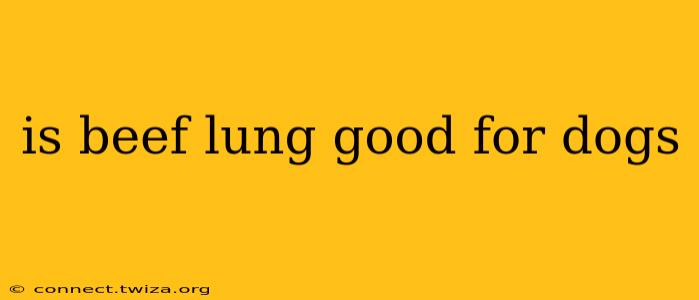Beef lung, often overlooked as a dog treat or ingredient, is gaining traction among pet owners seeking nutritious and affordable options. But is it truly beneficial for canine companions? Let's delve into the nutritional profile, potential benefits, and risks associated with feeding beef lung to your dog.
What are the Nutritional Benefits of Beef Lung for Dogs?
Beef lung is a surprisingly good source of several essential nutrients for dogs. It's relatively low in fat compared to other organ meats, making it a suitable option for dogs prone to weight gain. It's also a good source of protein, crucial for muscle building and repair. Furthermore, it contains various vitamins and minerals, although the exact amounts can vary depending on the source and preparation. These can include vitamin B12, iron, and zinc, all vital for a dog's overall health.
Is Beef Lung a Good Source of Protein for Dogs?
Yes, beef lung is a decent source of protein. Protein is essential for building and repairing tissues, producing enzymes and hormones, and supporting a strong immune system in dogs. While not as protein-dense as some other meats, the protein in beef lung is highly digestible and readily utilized by the canine body. Remember to always check the source and ensure the lung is properly processed and free from contaminants.
What are the Potential Risks of Feeding Beef Lung to Dogs?
While generally safe, there are potential risks to consider. Firstly, the source is crucial. Beef lung sourced from reputable suppliers who adhere to strict safety and hygiene standards is vital to minimize the risk of bacterial contamination or parasites. Secondly, raw beef lung carries a higher risk of bacterial contamination compared to cooked lung. Always cook beef lung thoroughly before feeding it to your dog to eliminate potential pathogens. Finally, some dogs may have sensitivities or allergies to beef lung, so introduce it gradually and monitor your dog for any adverse reactions such as digestive upset or skin irritation.
Can I Feed My Dog Raw Beef Lung?
While some dog owners opt for raw feeding, feeding raw beef lung carries a significant risk of bacterial contamination, including Salmonella and E. coli. Thorough cooking is recommended to eliminate these risks. Always consult with your veterinarian before introducing raw food into your dog's diet, and never feed raw lung to puppies, senior dogs, or dogs with compromised immune systems.
How Often Should I Feed My Dog Beef Lung?
Beef lung shouldn't form the entirety of your dog's diet. It should be offered as an occasional treat or supplementary ingredient, not a primary food source. The frequency depends on your dog's size, activity level, and overall dietary needs. A small treat once or twice a week is generally acceptable, but always consult with your veterinarian for personalized dietary recommendations.
How Should I Prepare Beef Lung for My Dog?
Proper preparation is essential. Thoroughly cook the beef lung until it's fully cooked through. Avoid overcooking, which can make it tough and less digestible. You can cut it into bite-sized pieces, or you can add it to your dog's regular food. Avoid adding any seasonings or other ingredients that might be harmful to dogs.
What are the Best Alternatives to Beef Lung for Dogs?
Numerous other nutritious options exist for enriching your dog's diet. Other organ meats like beef liver or heart can provide similar nutritional benefits. Alternatively, you can focus on high-quality commercial dog food that meets your dog's specific nutritional needs. Always consult your vet to ensure your dog is receiving a balanced and complete diet.
This information is for educational purposes only and should not be considered veterinary advice. Always consult with your veterinarian before making any significant changes to your dog's diet, particularly if your dog has any pre-existing health conditions. They can help you determine if beef lung is appropriate for your dog's individual needs and provide personalized recommendations.
